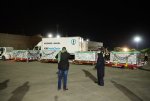
On Tuesday night, Kenya received the first batch of 1.02 million doses of the AstraZeneca-Oxford Covid-19 vaccines.
The vaccines were received by government dignitaries led by Health CS Mutahi Kagwe at the Jomo Kenyatta International Airport (JKIA), transported by Qatar Airways flight QR1341. Others who accompanied Kagwe include Maniza Zaman (UNICEF Representative to Kenya) and Dr Rudi Eggers (WHO Representative to Kenya).
Under normal circumstances, it would have been expected that the vaccines would have been transported by national carrier Kenya Airways (KQ), which recently converted one of its passenger Dreamliner to a cargo plane.
However, the choice of the carrier was to a greater extend influenced by UNICEF which was in charge of the transportation. UNICEF is part of the COVAX facility, a global solution to the Covid-19 pandemic that ensures participating countries have fair access to vaccines, regardless of their income level.
Under the COVAX facility, WHO and GAVI pay for the vaccines while UNICEF is doing the procurement and logistics.
Only two airlines from Africa have signed an agreement with the United Nations (UN) for the distribution of the Covid-19 vaccines worldwide.
The two African airlines include Nairobi-based Astral Aviation and Ethiopian Airways.
Other airlines include AirBridgeCargo, Air France/KLM, Emirates SkyCargo, Brussels Airlines, Cargolux, Cathay Pacific, Etihad Airways, IAG Cargo, Korean Air, Lufthansa Cargo, Qatar Airways, Saudia, Singapore Airlines, and United Airlines.
“These airlines have signed agreements with UNICEF to support the prioritization of delivery of Covid-19 vaccines, essential medicines, medical devices, and other critical supplies to respond to the pandemic,” said the agency in February.
The AstraZeneca-Oxford vaccine, which was manufactured by the Serum Institute of India and made available to the COVAX facility following a purchase agreement between Gavi, the Vaccine Alliance, and SII.
The first consignment of 1.02 million doses is part of an initial allocation to Kenya of 3.56 million doses.
In addition, UNICEF is providing 1,025,000 syringes and 10,250 safety boxes to Kenya, via a global stockpile funded and supported by Gavi.
“This has been made possible by the leadership of His Excellency President Uhuru Kenyatta and the hard work of the Ministry of Health. I would like to thank UNICEF, WHO, and GAVI for their support in procuring and transporting these life-saving vaccines and the Kenyan people for their cooperation over the past 11.5 months,” said Kagwe.
Vaccines will be moved from the central vaccine stores to nine regional vaccine stores, from where the counties will collect and distribute the vaccines to local hospitals at the county and sub-county levels.
